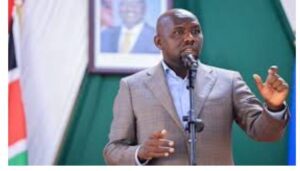World Bank pushes for higher water and sewer bills in Kenya

World Bank backs higher water and sewer bills in a deal seeking to help debt-ridden service providers
World Bank backs higher water and sewer bills in a deal seeking to help debt-ridden service providers.
Under new World Bank-supported reforms aimed at helping indebted service providers raise Sh166 billion for the expansion and upgrade of the aging networks, water and sewerage bills are expected to increase.
According to a recent assessment from the World Bank, the government has identified a set of changes that will help to raise some of the additional funds needed to meet the nation’s water and sanitation targets.
This involves raising tariffs from the existing 105 percent to 150 percent of the operating costs of the State-backed water corporations.
It is anticipated that during the coming years, an additional Sh45 billion will be made available to help maintain and upgrade water and sewage infrastructure.
But, the upcoming tariff change will make it necessary for water customers to make further financial sacrifices at a time when the cost of living has reached previously unheard-of heights.
High water rates paired with expensive gasoline, cooking oil, and basic maize flour will increase inflationary pressure in an economy where consumers have cut back on some goods and services to get through difficult times.
In 2021, the World Bank signaled the higher bills after it pushed for new conservation levies and increased regulatory charges for water companies as part of the global financier’s lending programme.
Most of the water service providers (WSPs) are operating at a loss, with the average water supply tariffs being 25 percent lower than the average cost of their service, the multilateral lender said.
The operating loss emerges before full recovery of capital investment, the World Bank added.
Water providers such as Nairobi City Water and Sewerage Company (NCWSC) provide piped water and sewer services primarily to urban residents.
The Water Services Regulatory Board has backed the upward review in tariffs to achieve operations and maintenance cost recovery.
“Stakeholders agreed that increasing tariffs is necessary. They noted the political constraints and stated that technical staff should provide recommendations and options to assist representatives in making the best choices for their community,” said the World Bank.
Brace for high Unga prices as over 10 maize millers shutdown
National Treasury breaks silence on dollar shortage after Suluhu’s remark
State steps in to sell cheap goods in shops amid high cost of living
The service providers have been lobbying for the review of tariffs that were last revised more than five years ago to cover the ballooning costs of operation and maintenance.
Under the new tariff guidelines, each service provider is expected to recover its full cost of services in the medium to long term and leave a surplus to allow it to improve its infrastructure.
In addition to increasing tariffs, the World Bank is also pushing for a reduction in free water, increased collection rates, and raising commercial finance on the strength of improved operating cash flows.
The multilateral lenders, including the International Monetary Fund (IMF), are expected to play a bigger role in shaping policy that would require the government to implement tough conditions across many sectors.
The IMF and World Bank advisories come on the back of their multi-billion shilling loan facilities to Kenya where money flows straight into the budget to top up the public purse.
Also read,
Ruto fires more Uhuru appointees in his latest appointments including Pauline Njoroge
Global Fund demands refund from govt after misappropriation by officials
Ruto’s plan to end fuel monopoly hits first hurdle after oil marketers challenge his deal
Follow us






